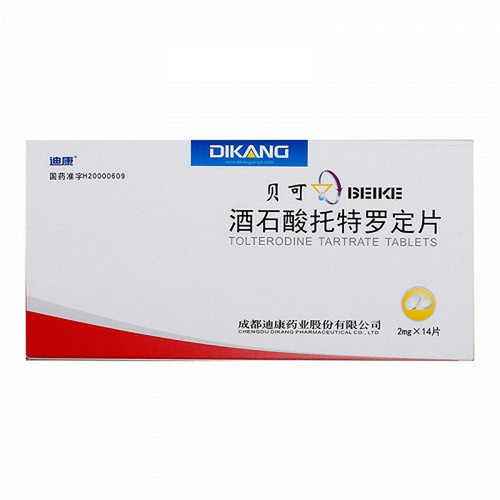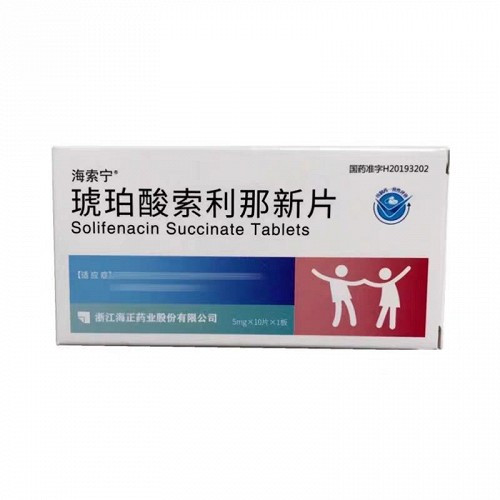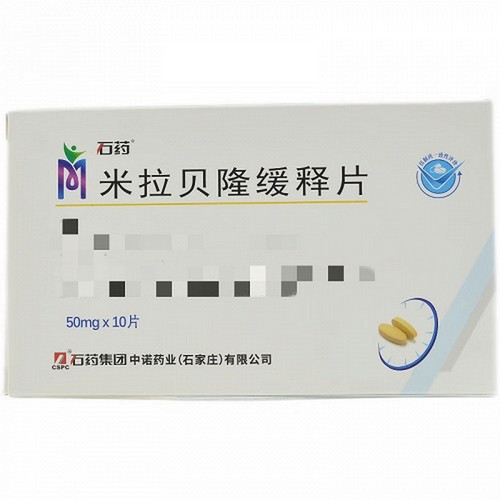Product Overview
[Drug Name]
Generic Name: Tolterodine Tartrate Tablets
Trade Name: Sheniting
English Name: Tolterodine Tartrate Tablets
Chinese Pinyin: Jiushisuantuoteluoding Pian
[Ingredients]
The main ingredient of this product is (R)-N,N-diisopropyl-3-(2-hydroxy-5-methylphenyl)-3-phenylpropylamine L(+)-tartrate.
[Properties]
This product is a white film-coated tablet that appears white after removal of the film coating.
[Indications]
This product is indicated for the treatment of urinary frequency, urgency, or urge incontinence due to overactive bladder.
[Dosage and Administration]
The recommended initial dose is 2 mg twice daily. The dose can be lowered to 1 mg twice daily based on the patient's response and tolerance. For patients with hepatic impairment or those taking CYP3A4 inhibitors (see Drug Interactions), the recommended dose is 1 mg twice daily.
[Adverse Reactions]
This drug's side effects are generally well tolerated and disappear after discontinuation. This drug may cause mild to moderate anticholinergic effects, such as dry mouth, dyspepsia, and decreased tear production. Common: Autonomic Nervous System: Dry mouth (>1/100); Gastrointestinal System: Dyspepsia, constipation, abdominal pain, flatulence, vomiting; Systemic: Headache; Eyes: Dry eyes; Skin: Dry skin; Mental: Drowsiness, nervousness; Central Nervous System: Paresthesia. Less Common: Autonomic Nervous System: Dysregulation (<1/100); Systemic: Chest pain. Rare Systemic: Allergic reaction (1/1000); Urinary System: Urinary retention; Central Nervous System: Confusion.
[Contraindications]
1. This drug is contraindicated in patients with urinary retention, gastric stagnation, or uncontrolled narrow-angle glaucoma. 2. This drug is contraindicated in patients with a confirmed allergic reaction. 3. This drug is contraindicated in patients with myasthenia gravis, severe ulcerative colitis, or toxic megacolon.
[Precautions]
1. This product may cause blurred vision. Those taking this product should exercise caution when driving, operating machinery, or performing hazardous work while taking it. 2. Patients with significantly impaired liver function should not exceed half a tablet (1 mg) per dose. 3. This product should be used with caution in patients with impaired renal function, autonomic nervous system disorders, or hiatal hernias. 4. Due to the risk of urinary retention, this product should be used with caution in patients with bladder outlet obstruction. Due to the risk of gastric retention, it should also be used with caution in patients with gastrointestinal obstructive diseases such as pyloric stenosis. 5. There is no experience with this product in children and its use in children is not recommended. 6. This product should be used with caution in pregnant women. If taking this product during breastfeeding, breastfeeding should be discontinued.
[Use in Special Populations]
Precautions for Pediatric Use:
There is no experience with this product in children and its use in children is not recommended.
Precautions for Pregnancy and Lactation:
Breastfeeding should be discontinued if this product is taken during breastfeeding.
Precautions for Elderly People:
This study has not been conducted and no reliable references are available.
[Drug Interactions]
Coadministration with other anticholinergic drugs may enhance therapeutic effects but also increase adverse reactions. Conversely, muscarinic receptor agonists may reduce the efficacy of this drug. Other drugs that require cytochrome P450 2D6 (CYP 2D6) or CYP3A4 metabolism or inhibit cytochrome activity may interact pharmacokinetically with this drug. For example, coadministration with fluoxetine (fluoxetine is a strong inhibitor of CYP2D6, and fluoxetine is metabolized to demethylfluoxetine, a CYP3A4 inhibitor) may slightly increase the amount of unbound tolterodine and its 5-hydroxymethyl metabolite, but this does not result in a clinically significant interaction. Extreme caution is advised when coadministering strong CYP3A4 inhibitors, such as macrocyclic antibiotics (erythromycin and clarithromycin) or antifungals (ketoconazole, miconazole, itraconazole). Clinical studies have shown no interaction between this drug and warfarin or oral contraceptives (levonorgestrel/ethinyl estradiol). Clinical studies have not shown that this product inhibits the activity of CYP2D6, 2C19, 3A4, or 1A2.
[Pharmacological Action]
This product is used to relieve symptoms of urinary frequency, urgency, and urge incontinence caused by overactive bladder. It is a competitive M cholinergic receptor blocker. Animal studies suggest that this product has higher selectivity for the bladder than for the salivary glands, but this has not been clinically confirmed. After oral administration, this product is metabolized in the liver to form the active metabolite, the 5-hydroxymethyl derivative, which is the primary pharmacological agent. Its anticholinergic activity is similar to that of this product. Both are highly selective for M cholinergic receptors and have little effect or affinity on other neurotransmitter receptors and potential cellular targets (such as calcium channels).
[Storage] Store tightly closed at room temperature.
[Specification] 2mg x 14 tablets
[Packaging] Box
[Expiration Period] Tentatively 24 months
[Approval Number] National Medicine Standard H20000602
[Manufacturer] Company Name: Nanjing Meirui Pharmaceutical Co., Ltd.








